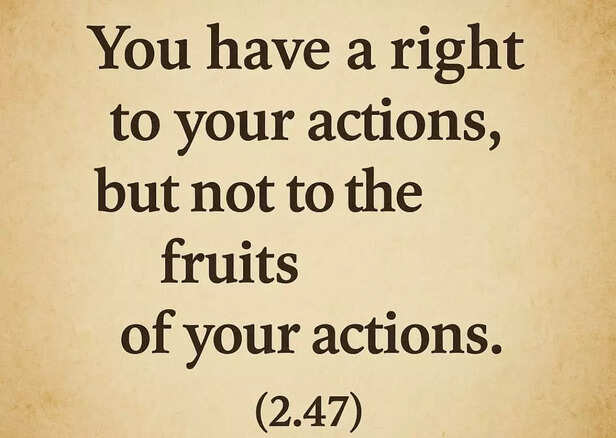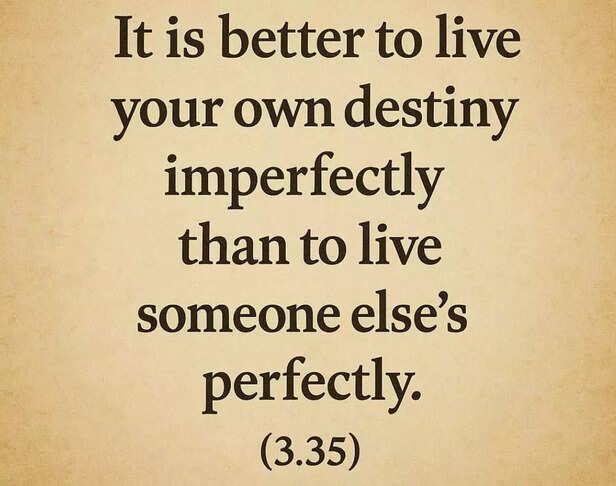Bhagavad Gita vs. Self-Help Books: Who’s Giving the Real Life Advice?
Prem Kamde | Tue, 17 Jun 2025
In a world flooded with self-help books promising success, love, healing, and hustle, one ancient text still stands tall—The Bhagavad Gita, a 5,000-year-old spiritual powerhouse. But here’s the big question:Are today’s bestselling life coaches just rebranding ancient wisdom?Or does modern self-help actually offer something the Gita doesn’t?
Bhagavad Gita vs. Self-Help Books (Image credit-AI)
This explosive comparison dives deep into both realms—the timeless truths of the Gita and the fast-selling formulas of today’s self-help gurus. We’ll explore how each one tackles real-life struggles: identity, failure, fear, relationships, purpose, and peace.
Is the Gita too spiritual for today’s world—or is it the original manual for mental clarity and emotional mastery?
Prepare for a head-to-head that might just change how you seek answers forever.
“Be fearless and know the truth. Let go of illusions.”
— Bhagavad Gita, 2.13
In a world where every second influencer drops a new self-help book, one question keeps echoing louder:
Can anything actually beat the timeless life wisdom of the Bhagavad Gita?
Let’s unpack that—not like a lecture, but like a real, honest conversation.
You: “I mean, self-help books are everywhere… from healing heartbreaks to building habits. Why even compare them to a scripture?”
Gita Speaks: “Because where they offer tips, the Gita offers transformation.”
Let’s break it down: What is the core difference?
Self-help books often focus on solving one specific area of life: confidence, productivity, relationships, money, mindset, etc. They give you frameworks, step-by-step advice, journaling prompts, and catchy acronyms. They’re easy to follow, modern, and sometimes fun.
The Bhagavad Gita, on the other hand, doesn’t give you ‘7 hacks to success.’
It gives you something far deeper:
> A complete inner blueprint for handling life’s chaos, duty, emotions, and purpose.
You: “But aren’t both trying to help people improve their lives?”
Absolutely. But how they help you is very different.
Let’s compare — Self-Help Books vs. The Gita:

Approach Tactical & practical Philosophical & spiritual
Goal Achievement & success Inner peace & self-realization
Tone Motivational, casual Reflective, authoritative
Time-tested? A few decades at most Over 5,000 years old
Who’s speaking? Coaches, authors, psychologists Lord Krishna (Divine consciousness)
End Result Habit change, productivity, mental clarity Emotional mastery, detachment, dharma (life purpose)
Real Talk: What can the Gita teach that most self-help books miss?

> “You have a right to your actions, but not to the fruits of your actions.” (2.47)
Self-help often says: “Set a goal. Chase the result.”
Gita says: “Do your duty, but don’t be obsessed with outcomes.”
Why? Because attachment to results causes anxiety and disappointment.

Self-help teaches emotional regulation.
Gita teaches emotional transcendence.
It doesn’t say “feel better.”
It says: “Understand who is feeling, and rise above the temporary self.”
That’s not relief. That’s liberation.

> “It is better to live your own destiny imperfectly than to live someone else’s perfectly.” (3.35)
Self-help often says “follow your passion.”
The Gita says: follow your duty, even if it’s uncomfortable.
Passion fades. Dharma (your soul-aligned purpose) sustains you.
You: “Okay, but self-help books feel more relatable… they’re written for modern problems.”
True. And that's their biggest strength and weakness.
Yes, they’re accessible. But often, they’re surface-level. One book says hustle. Another says rest. One tells you to cut people off. Another says forgive everyone.
That’s the trap: conflicting advice based on trends, not timeless truth.
The Gita?
It speaks to the human condition, not just modern situations.
Anxiety, failure, indecision, betrayal, purpose, ego, grief—Krishna covers it all in 700 verses.
Let’s make it interactive: Ask Yourself These 3 Questions
(Grab a pen if you’re serious.)

1. Do I want motivation, or do I want meaning.
2. Have I been chasing success but still feel lost inside?
3. What if the peace I’m seeking isn’t in doing more, but in understanding deeper?
It’s Not a Competition, It’s a Choice.

Self-help books are great tools. They can get you started. They can help you reflect, act, and build better habits.
But the Bhagavad Gita?
It’s not just a “tool.” It’s a timeless inner compass.
Where self-help motivates, the Gita awakens.
So don’t choose one against the other.
Start where you are. But when you’re truly ready to go inward—beyond hacks, beyond hustle—the Gita is already waiting for you.
Unlock insightful tips and inspiration on personal growth, productivity, and well-being. Stay motivated and updated with the latest at My Life XP.
Is the Gita too spiritual for today’s world—or is it the original manual for mental clarity and emotional mastery?
Prepare for a head-to-head that might just change how you seek answers forever.
“Be fearless and know the truth. Let go of illusions.”
— Bhagavad Gita, 2.13
In a world where every second influencer drops a new self-help book, one question keeps echoing louder:
Can anything actually beat the timeless life wisdom of the Bhagavad Gita?
Let’s unpack that—not like a lecture, but like a real, honest conversation.
You: “I mean, self-help books are everywhere… from healing heartbreaks to building habits. Why even compare them to a scripture?”
Gita Speaks: “Because where they offer tips, the Gita offers transformation.”
Let’s break it down: What is the core difference?
Self-help books often focus on solving one specific area of life: confidence, productivity, relationships, money, mindset, etc. They give you frameworks, step-by-step advice, journaling prompts, and catchy acronyms. They’re easy to follow, modern, and sometimes fun.
The Bhagavad Gita, on the other hand, doesn’t give you ‘7 hacks to success.’
It gives you something far deeper:
> A complete inner blueprint for handling life’s chaos, duty, emotions, and purpose.
You: “But aren’t both trying to help people improve their lives?”
Absolutely. But how they help you is very different.
Let’s compare — Self-Help Books vs. The Gita:
Area Self-Help Books Bhagavad Gita

Self-Help Books
( Image credit : Freepik )
Approach Tactical & practical Philosophical & spiritual
Goal Achievement & success Inner peace & self-realization
Tone Motivational, casual Reflective, authoritative
Time-tested? A few decades at most Over 5,000 years old
Who’s speaking? Coaches, authors, psychologists Lord Krishna (Divine consciousness)
End Result Habit change, productivity, mental clarity Emotional mastery, detachment, dharma (life purpose)
Real Talk: What can the Gita teach that most self-help books miss?
1. Detach from Results, Focus on Action

(2.47) (Image credit- AI)
> “You have a right to your actions, but not to the fruits of your actions.” (2.47)
Self-help often says: “Set a goal. Chase the result.”
Gita says: “Do your duty, but don’t be obsessed with outcomes.”
Why? Because attachment to results causes anxiety and disappointment.
2. Rise Above Emotions, Don’t Just Manage Them

Rise Above Emotions, Don’t Just Manage Them
( Image credit : Freepik )
Self-help teaches emotional regulation.
Gita teaches emotional transcendence.
It doesn’t say “feel better.”
It says: “Understand who is feeling, and rise above the temporary self.”
That’s not relief. That’s liberation.
3. Purpose isn’t passion—it’s dharma

Purpose isn’t passion—it’s dharma (Image credit- AI)
> “It is better to live your own destiny imperfectly than to live someone else’s perfectly.” (3.35)
Self-help often says “follow your passion.”
The Gita says: follow your duty, even if it’s uncomfortable.
Passion fades. Dharma (your soul-aligned purpose) sustains you.
You: “Okay, but self-help books feel more relatable… they’re written for modern problems.”
True. And that's their biggest strength and weakness.
Yes, they’re accessible. But often, they’re surface-level. One book says hustle. Another says rest. One tells you to cut people off. Another says forgive everyone.
That’s the trap: conflicting advice based on trends, not timeless truth.
The Gita?
It speaks to the human condition, not just modern situations.
Anxiety, failure, indecision, betrayal, purpose, ego, grief—Krishna covers it all in 700 verses.
Let’s make it interactive: Ask Yourself These 3 Questions
(Grab a pen if you’re serious.)

Questions
( Image credit : Freepik )
1. Do I want motivation, or do I want meaning.
2. Have I been chasing success but still feel lost inside?
3. What if the peace I’m seeking isn’t in doing more, but in understanding deeper?
It’s Not a Competition, It’s a Choice.

It’s a Choice.
( Image credit : Freepik )
Self-help books are great tools. They can get you started. They can help you reflect, act, and build better habits.
But the Bhagavad Gita?
It’s not just a “tool.” It’s a timeless inner compass.
Where self-help motivates, the Gita awakens.
So don’t choose one against the other.
Start where you are. But when you’re truly ready to go inward—beyond hacks, beyond hustle—the Gita is already waiting for you.
Unlock insightful tips and inspiration on personal growth, productivity, and well-being. Stay motivated and updated with the latest at My Life XP.











